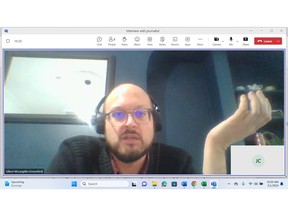Violent threats part of online abuse in N.B.'s 2020 election
Researcher warns that candidates are getting turned off by social media hostility, a threat to democracy

Article content
An academic who’s studied online abuse of candidates in New Brunswick’s 2020 election says the hostility on social media poses a threat to democracy.
Gilbert McLaughlin, a criminology professor at Liverpool Hope University in England, worries that fewer good candidates will stand for election because they don’t want to endure a barrage of nastiness.
“One candidate told me in confidence that their stress level was so high, they panicked when they saw an unmarked box delivered to their headquarters during the election campaign,” said McLaughlin, who’s originally from Tracadie and speaks with an Acadian-British accent after spending two years overseas.
“They decided to lock down the headquarters and call the cops. The authorities opened the box and inside were flowers and a thank you letter.”
The academic has written two papers – one about online vitriol during the 2020 campaign, published in the most recent issue of the Journal of New Brunswick Studies, and the other, with co-author Véronique Chadillon-Farinacci of Université de Moncton, on the fear those same candidates had for their personal safety, slated to be published in an upcoming edition. The academics promised those politicians anonymity in their reports.
McLaughlin took a snapshot in time – Sept. 14 and 15, 2020, the day before and after the election – and scoured Facebook pages. Of 227 candidates officially registered, 53 did not have a Facebook profile and were left out, leaving 174 in the sample.
The one that really jumped out at me was someone asking a candidate if she’d agree to have sex with him, if he paid.
Gilbert McLaughlin
He then categorized the abuse and provided several examples of people using accusatory words, denigrating language and an abusive or humiliating tone.
“There were some violent threats, but the one that really jumped out at me was someone asking a candidate if she’d agree to have sex with him, if he paid. It wasn’t even an anonymous account. You see the guy’s face and name. Imagine you’re a candidate and you have to put up with something like that.”
New Brunswick’s 2020 provincial election was the first in Canada to be held during the pandemic. Premier Blaine Higgs called it two years ahead of schedule because he blamed the opposition Liberals and Greens for destabilizing his minority Progressive Conservative government. Due to health concerns at the time, which led to masking and social distancing, many candidates did not go door-to-door and relied on social media to get their message out.
This made the election rife for online chatter, much of it hateful and denigrating. McLaughlin says he probably didn’t even see the worst of it because campaign workers often deleted the most disgusting comments as soon as they were posted.
Candidates rarely received the same ugly messages face to face, or even on the phone. Haters prefer the forum of posting from a keyboard to the wider world, he said.
“Interestingly, most of the abusers want their message to be seen and they want it to be public. So the candidates I spoke with did not receive as many hateful comments through phone calls, emails or by text. It was mostly on social media platforms.”
Another phenomenon he observed: on hot-button issues, such as the abortion debate and the closure of Clinic 540, the only private abortion provider in New Brunswick, many of the people posting their comments on social media were from outside the province.
“I talked to one minister who told me he thought of changing his vote on an issue based on social media feedback,” McLaughlin said. “He was trying to represent his constituents and thought they felt a certain way about an issue. But if you looked at where the posts were coming from, many were from outside the province. You had to take the time to dig a little deeper.”
The Trudeau Liberal government in Ottawa introduced a new online harms bill last month that it says will protect children and others from hate-filled and threatening speech.
But the legislation is controversial. Conservative Opposition Leader Pierre Poilievre says it’s meant to ban political opinions that Prime Minister Justin Trudeau doesn’t agree with.
While much of the bill’s focus is to stop the exploitation of children online, part of it amends the Criminal Code to create a new standalone hate crime offence that would allow penalties up to life imprisonment to deter hateful conduct, as well as raise the maximum punishments for hate propaganda offences from five years to life imprisonment for advocating genocide.
Without passing judgment on that legislation, McLaughlin said coming up with ways to stop invective directed at politicians isn’t easy in a democracy that cherishes free speech. Dictatorships, he pointed out, often try to control and curb online content.
“It’s a difficult question. Because what you really don’t want to do is limit the freedom that the internet gives to marginalized people who often don’t have a voice. We don’t want to censor the internet at the level that China does. What you want is some middle ground that helps us avoid the nastiest comments, the most violent and threatening ones. The impunity right now is so high, it encourages perpetrators to do so much.”
– with files from the National Post












Postmedia is committed to maintaining a lively but civil forum for discussion. Please keep comments relevant and respectful. Comments may take up to an hour to appear on the site. You will receive an email if there is a reply to your comment, an update to a thread you follow or if a user you follow comments. Visit our Community Guidelines for more information.